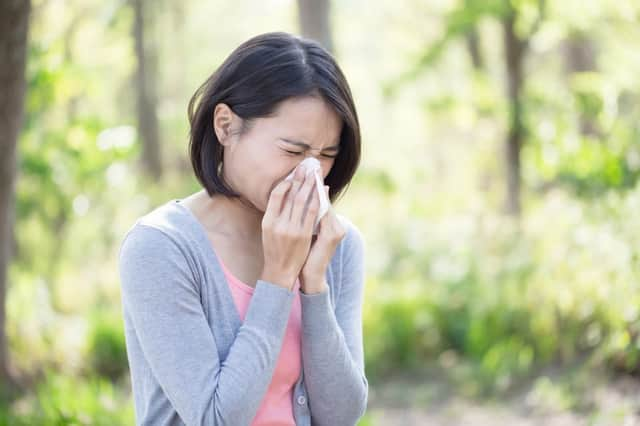This is why hay fever symptoms are so bad at the moment - and how to relieve them


The recent bout of warm weather may have been welcomed with open arms by many, but for others, the summer sun has wreaked havoc with hay fever symptoms.
High pollen counts have seen many sufferers experience more severe symptoms than usual for this time of the year, with experts attributing the cause to a drop in pollution levels.
Why are symptoms so bad?
Advertisement
Hide AdAdvertisement
Hide AdSymptoms of sneezing, itchy eyes and a runny nose are particularly bad right now, due to the particularly good weather in May, which was one of the hottest and driest on record.
The high temperatures led to significantly high pollen counts, causing allergic reactions to be more severe.
Hay fever is typically at its worst between late March and September, according to the NHS, especially when the weather is warm, humid and windy, as this is when the pollen count is at its highest.
Health experts have also suggested the reduction of pollution from fewer cars on the road in lockdown could also be a factor in worsening symptoms. As the air is much cleaner, pollen levels have felt much more intense than usual, contributing to heightened symptoms.
Advertisement
Hide AdAdvertisement
Hide AdHowever, some research has shown that pollution can actually make hay fever allergies worse.
What are the symptoms of hay fever?
Symptoms of hay fever include:
- sneezing and coughing
- a runny or blocked nose
- itchy, red or watery eyes
- itchy throat, mouth, nose and ears
- loss of smell
- pain around your temples and forehead
- headache
- earache
- feeling tired
Asthma sufferers may also experience a tight feeling in their chest, shortness of breath, wheezing and coughing.
Symptoms of hay fever can last for weeks or months, according to the NHS, unlike a cold which usually goes away after around one or two weeks.
How do symptoms differ to coronavirus?
Some people have mistakenly confused symptoms of hay fever for coronavirus, as there are a number of similarities.
Advertisement
Hide AdAdvertisement
Hide AdHowever, while signs of hay fever include sneezing and a cough, much like coronavirus, the main difference is that it does not usually cause a high fever. Hay fever sufferers also generally do not feel too unwell with it, unlike with coronavirus.
People who do suffer with hay fever are advised to compare their symptoms to what they have experienced in previous years if they are concerned.
How can I relieve hay fever symptoms?
There is currently no cure for hay fever, but there are a number of remedies you can try to relieve symptoms when the pollen count is high.
The NHS advises:
- putting Vaseline around your nostrils to trap pollen
- wearing wraparound sunglasses to stop pollen getting into your eyes
Advertisement
Hide AdAdvertisement
Hide Ad- showering and changing your clothes after you have been outside to wash pollen off
- staying indoors whenever possible
- keeping windows and doors shut as much as possible
- vacuuming regularly and dust with a damp cloth
- buying a pollen filter for the air vents in your car and a vacuum cleaner with a special HEPA filter
You can also try taking antihistamine drops, tablets or nasal sprays to help with itchy and watery eyes, sneezing and a blocked nose.